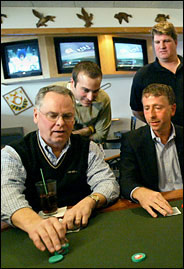 |
 |
 |
 Entertainment | February 2005 Entertainment | February 2005  
Bars Test Laws on Gambling With Moneyless Poker Games
 Jodi Wilgoren - NYTimes Jodi Wilgoren - NYTimes


| Minnesota state legislators who favor legalizing low-stakes Texas Hold'em play a game using chips without real value. From left, Senator Mike McGinn, Senator Dave Kleis and Representative Larry Hasch.

|
T. Cloud, Minn. - Not 20 minutes into a No Limit Texas Hold'em poker tournament at the Granite Bowl bar and grill here, State Senator Mike McGinn pushed his entire pile of chips into the pot. State Senator Dave Kleis hardly hesitated before following suit, and State Representative Tom Hackbarth quickly joined the "all in" chorus.

"No wonder we've got budget problems at the state," cracked their colleague, State Senator Brian LeClair, who had folded his own cards long before.

"Well, it's other people's money," Mr. McGinn said of the taxes that fill state coffers. "It's kind of the same thing."

Actually, the eight lawmakers gathered around the green felt here on Saturday afternoon, all but one Republicans, were not playing for money at all, but for T-shirts proclaiming, "Poker is Not a Crime" - and to make a point. Betting with chips that had been seized last summer in a police raid on the Granite Bowl's free weekly poker tournaments, they came to support a bill sponsored by Mr. Kleis, who represents St. Cloud, that would explicitly legalize Texas Hold'em (but not other forms of poker) so long as prizes do not top $200.

As televised tournaments make Hold'em ever more popular and mainstream, Minnesota is one of at least half a dozen states grappling with a new phenomenon: poker games with little more than bragging rights at stake. Law enforcement agencies and liquor commissions in states with lotteries, racetracks and even casinos have arrested bar owners and players in recent months, threatening fines or jail time under statutes that proponents of poker see as anachronistic.

On Wednesday, even as Mr. Kleis's bill adding Texas Hold'em to the state's list of legal card games - cribbage, skat, sheephead, bridge, euchre, pinochle, gin, 500, smear and whist - is considered by a Senate committee in St. Paul, two bars in Louisiana face administrative hearings where they could lose their liquor licenses for betting that poker would bring them a full house.

In Illinois, the liquor commission has issued $500 citations to at least four bars, two of which advertised tournaments but never held them. In California, the Department of Justice has declared that even tournaments in which no money is bet require a gaming license - and there is a moratorium on new licenses.

In Texas, a lawyer for the state prosecutors' association contends that playing for any prize - even points to be redeemed later for T-shirts or trips - is illegal, and the attorney general is expected to issue an opinion on the matter in May.

The larger question in each case is what, exactly, constitutes gambling, and whether poker will remain ensconced in backrooms or become as ubiquitous as bingo.

"We target people who want to have fun in life, not the people who want to risk millions of dollars," said Shawn Riley, president of the Amateur Poker League, which runs 500 free tournaments a week across eight states. "To gamble you have to be risking something of value. If they outlaw this, they should be outlawing dominoes and Monopoly."

But while Mr. Riley's organization bans entry fees or even drink minimums, and will prohibit prizes altogether if local officials object, its 44,000 members do amass points that lead them to regional and national tournaments where they can win a seat at the World Series of Poker, which otherwise costs $10,000 to enter. That makes it illegal, said Brian DeJean, a lawyer for the Louisiana Office of Alcohol and Tobacco Control. He says any game operated as a business - people being paid to deal, for example, or bars increasing revenues from players buying drinks - is verboten.

"We're not seeing friendly games where five people show up and sit around the table, what we're seeing is games where somebody is making some money," Mr. DeJean said. "We would not be having the same conversation if every Tuesday was prostitution night in these bars."

Poker, which combines the luck of the draw with strategy based on mathematical probability and more than a little bluffing, dates back more than 1,000 years, to China, and spread across the United States by steamboat and wagon train in the early 19th century.

Laws against poker date back at least 100 years, though most states allow it to be played for money in private homes, as long as games are not advertised and organizers do not take a cut of the pot. | 
 | |
 |



